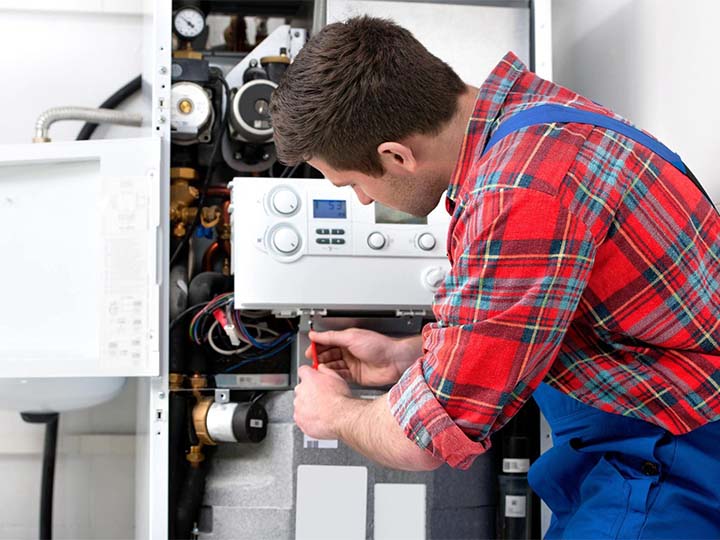
How to Maintain Your Boiler
Boiler maintenance is essential for any household or commercial property relying on this system for heating. Regular boiler servicing ensures efficient operation and prevents potential boiler problems that can be costly and dangerous. Adopting a proactive maintenance approach can significantly extend your boiler’s lifespan, making it a wise investment for comfort and safety.
This comprehensive guide will explore the best boiler maintenance practices, boiler servicing, efficiency, and common boiler problems.
Whether you’re a homeowner or managing commercial properties, this guide will provide valuable insights to keep your heating system in top condition.
Why Regular Boiler Servicing is a Must
The Importance of Annual Check-ups
Scheduling annual boiler servicing is crucial for detecting early issues and preventing costly repairs. A professional technician can identify parts that need replacement or cleaning, ensuring your system runs smoothly.
Benefits of Timely Servicing
- Increased Efficiency: Regular check-ups help keep your boiler running optimally, reducing energy consumption and lowering bills.
- Safety: Technicians can spot and fix potential hazards safeguarding your home or business, such as gas leaks or carbon monoxide production.
- Extended Boiler Life: Preventative maintenance can significantly extend the lifespan of your boiler, saving you money on premature replacement costs.
Enhancing Boiler Efficiency
Tips for Optimised Performance
- Insulate Pipes: Prevent heat loss by insulating your boiler’s pipes, especially in unheated areas.
- Upgrade Thermostat: A programmable thermostat can improve efficiency by adjusting the temperature based on your schedule.
- Regular Cleaning: Keep the boiler and its components clean to ensure air and gas flow freely, optimising combustion and efficiency.
Understanding the Role of Water Quality
Water quality plays a significant role in boiler efficiency. Hard water can lead to scale buildup inside the boiler, reducing heat transfer and efficiency. Regularly check water quality and consider installing a water softener if necessary.
Troubleshooting Common Boiler Problems
Recognising and Addressing Issues
- No Heat or Hot Water: This could be due to several issues, including thermostat problems, low water levels, or failure of heating components.
- Leaking and Dripping: Various issues could cause leaks, from broken internal components to pressure problems. It’s essential to identify the source quickly to prevent further damage.
- Strange Noises: Banging, whistling, or gurgling noises can indicate air in the system, low water pressure, or kettling due to limescale buildup.
Practical Maintenance Tips
Keeping Your Boiler in Top Condition
- Regularly Check the Pressure: Ensure the boiler pressure is within the manufacturer’s recommended range.
- Bleed Radiators: Release any trapped air in radiators to improve efficiency and heat distribution.
- Schedule Professional Inspections: Professional inspections can catch issues you might miss beyond DIY checks.
Boiler Maintenance Schedule
Daily Checks and Actions
- Monitor the water level gauge glass, noting the readings on the pressure and temperature gauges.
- Test the Low Water Cut-Off (LWCO) and Auxiliary Low Water Cut-Off (ALWCO) functions to confirm the burner ceases operation as required.
- Clear the water column and gauge glass through the blowdown.
- Deactivate the burner control switch to assess flame failure response.
- Inspect the operating control and high-limit control for proper function.
- Execute a bottom blowdown to eliminate any accumulated sludge and sediment.
- Examine the burner’s refractory cone for any signs of damage or overheating.
Weekly Upkeep
- Inspect and adjust, if necessary, all connections on burner controls and automatic draft controllers.
- Evaluate the air damper on the burner for optimal operation.
- Conduct tests on the gas train’s valve operations.
- Review the pilot and igniter’s condition, observing the flame’s quality.
- Conduct a blowdown of the boiler water level through the drain, ensuring the burner stops before the water disappears from the gauge glass.
Monthly Tasks
- Conduct tests on the boiler’s limit controls.
- Assess the flame detection system for accuracy.
- Inspect the blowdown system for signs of sludging at the boiler’s base.
- Ensure the blowdown separator and cooler are functioning correctly.
- Verify that floor drains are operating as intended.
- Check the boiler’s fresh air inlet screens for any blockages.
Yearly Maintenance
- Disassemble and inspect the LWCO and ALWCO for signs of sludge buildup, corrosion, or issues with electrical switches.
- Tune the burners and their settings for optimal performance. Engaging a qualified technician for quarterly tuning is advisable.
- Check the boiler’s fireside for any soot or damage and the waterside for scale or corrosion; clean both thoroughly.
- Conduct a boiler hydrostatic test to identify leaks, particularly at tube joints and piping.
- Inspect all refractory materials for signs of wear or damage.
- Verify the gas regulator pressure settings are correct.
- Either replace or recertify all safety valves to ensure they meet safety standards.
- To confirm their integrity, perform a bubble test on the fuel train safety shut-off valves.
Looking for professional boiler maintenance or carpentry services? Contact Emburys Carpentry today to ensure your boiler is in peak condition and your property’s carpentry needs are met with expert craftsmanship.
Frequently Asked Question
Late summer or early fall is ideal, preparing your system for the demands of the colder months.
With regular maintenance, a boiler can last 15-20 years, sometimes even longer.
A professional should do annual servicing while you can perform basic maintenance, such as checking pressure and bleeding radiators.
Unusual noises decrease efficiency, and any signs of leaking water indicate that your boiler requires professional attention.

